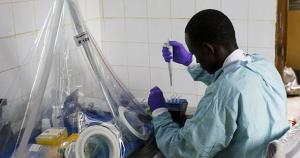Statement on the Monkeypox Case in Pujehun District, Sierra Leone
An isolated case of monkeypox has been confirmed in Pujehun district, Sierra Leone. This is the third known occurrence of monkeypox in the country, with the first reported case in 1970 and the second in 2014.
The patient, a 35-year-old male, was admitted to Pujehun District Hospital on 25th March 2017 where he is currently undergoing supportive treatment. Biological samples were shipped to Kinshasa, the Democratic Republic of Congo for laboratory testing and were confirmed positive for the monkeypox virus on 17th April 2017.
Active surveillance has been instituted in the affected community, with no new cases identified to date. Thirteen close contacts to the index case are being monitored. None have developed any febrile illness and/or skin lesions since the last exposure. The contacts will continue to be monitored for an additional 17 days (which is twice the usual incubation period for the monkeypox virus).
Monkeypox is a rare viral disease that occurs primarily in the rainforest areas of Central and West Africa. It is transmitted to people mainly from infected animals, including squirrels, rats, mice and primates. The monkeypox virus is not highly infectious between humans, with limited secondary transmission.
The symptoms of monkeypox which include fever, headache, lymphadenopathy (swelling of the lymph nodes), back pain, muscle aches and fatigue, followed by rash and skin lesions, can usually be treated with supportive care at a health facility. Typically, case fatality in monkey pox outbreaks has been between 1% and 10%, with most deaths occurring in younger age groups.
The Ministry of Health and Sanitation in Sierra Leone with support from WHO, CDC and other partners continues to closely monitor the situation, whilst undertaking intensive social mobilization in the affected community to promote early healthcare seeking behaviour and preventive measures. Preventive measures include avoiding bushmeat and practicing good hand-washing with soap and water.
The public is hereby advised to abstain from trapping and eating bushmeat, especially monkeys and rodents such as squirrels and rats which can be vectors for the monkeypox virus.
Healthcare workers have been informed of the situation and are on alert to provide the necessary care and support to the public or any sick person.
This is a joint information statement from Sierra Leone's Ministry of Health and Sanitation and WHO.
For more information on monkeypox, go to http://www.who.int/mediacentre/factsheets/fs161/en/
Contacts
Harold Thomas
Communications Pillar Lead
Public Health National Emergency Operations Center
Ministry of Health and Sanitation- GoSL
Phone: +232 76 602460
Email: haroldthomas2007 [at] yahoo.comtarget="_blank"
Laura Keenan
Communications Lead
World Health Organization Sierra Leone
Phone: +232 78 633952
Email: keenanl [at] who.int
Kadrie Koroma
Public Relations Officer
Ministry of Health and Sanitation
Phone:+232 76 672962
Email: kadriekoroma [at] yahoo.comtarget="_blank"




